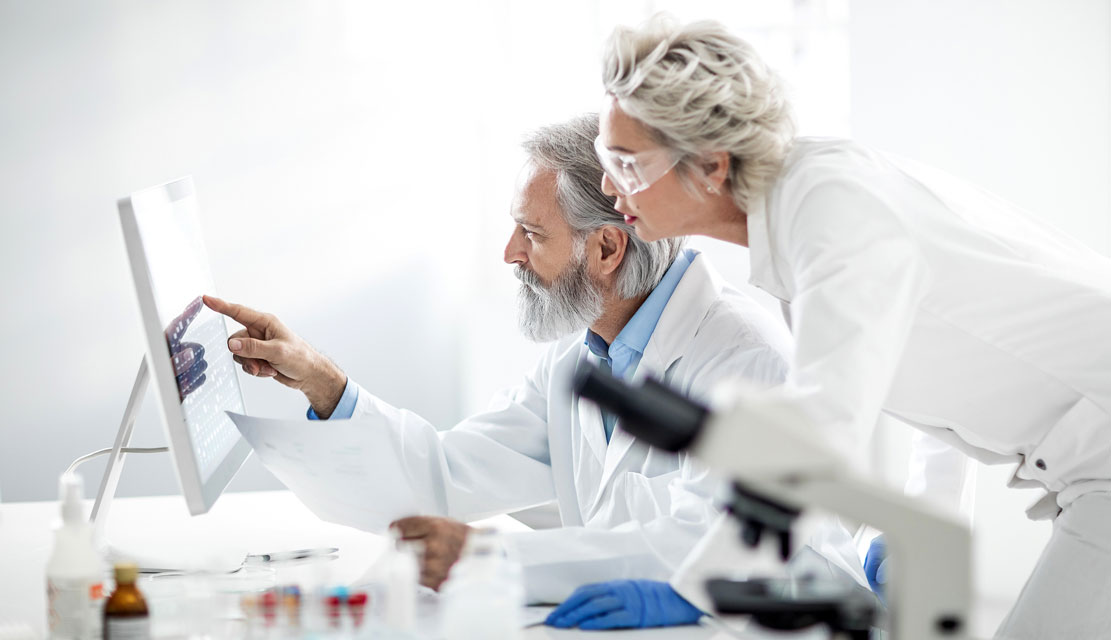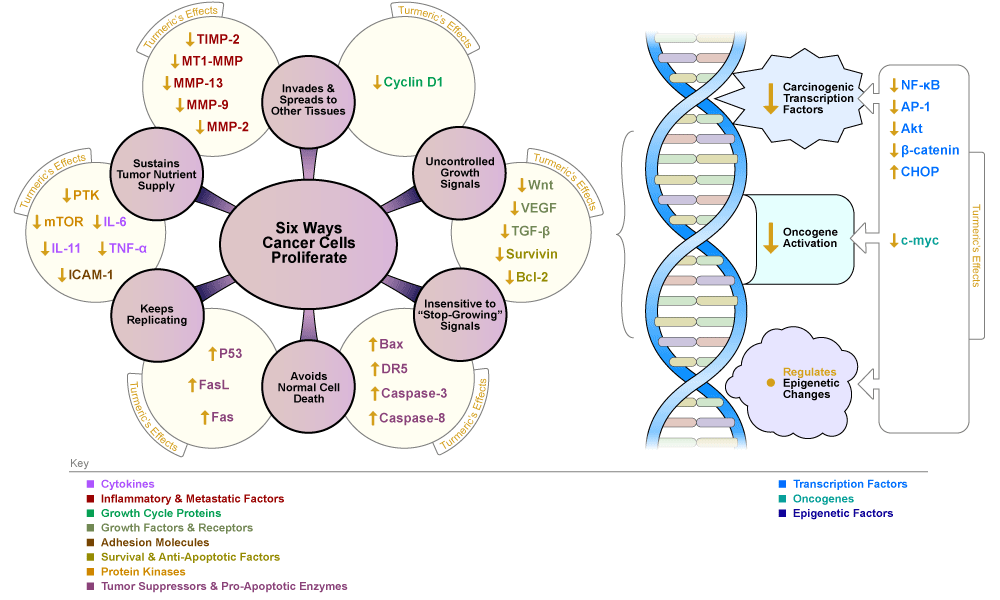Could Turmeric Compounds Help Stop Soft Tissue Sarcomas?
Most cancers begin in epithelial tissue cells in the body. These are carcinomas. Those that begin in bone, cartilage, fibrous tissues, and muscles represent about 2% of cancers, and are called sarcomas. (vi.426)
Studies suggest that turmeric compounds may be able to help treat various sarcomas: (vi.240)
| Soft / Connective Tissue Sarcomas | Bone Sarcomas |
|---|---|
|
Leiomyosarcoma (vi.134) Liposarcoma (vi.134, 427) Lymphosarcoma (vi.102) Reticulum cell sarcoma (vi.428) Rhabdomyosarcoma (vi.429) |
Ewing's sarcoma (vi.429) Fibrosarcoma (vi.240) Osteosarcoma (vi.429) |

What Causes Sarcoma?
Environmental factors are linked to many of these sarcomas. These include exposure to toxic chemicals (e.g., dioxin and pesticides) and radiation. Some are also linked to viruses, such as Kaposi's sarcoma, which affects the skin. (vi.318, 430)
Genetics may also play a role in increasing susceptibility. Li-Fraumeni syndrome is an inherited condition linked to higher risk of cancer at an early age, including soft tissue sarcoma. Rarely, uterine fibroids can transform into uterine leiomyosarcomas. (vi.431, 432)
How Can Turmeric Help Fight Sarcoma?
Turmeric and its compounds have anti-inflammatory and antitumor properties that research suggests can help block the growth or spread of various types of sarcomas. Clinical and animal studies indicate that using turmeric or its compounds along with conventional sarcoma therapy can also be beneficial. There are even clinical studies recruiting to study the effects of turmeric's curcumin compounds combined with herbal ashwagandha extract to treat osteosarcoma. (vi.426, 427, 433)
How Do Turmeric Compounds Work on Sarcomas?
Preclinical lab and animal research show turmeric compounds have the following effects:
| Turmeric Compound | Effects |
|---|---|
|
Question: Can alpha-linolenic acid (ALA) help fight sarcoma? Answer: Preclinical studies show that ALA suppresses osteosarcoma cell growth. (vi.434) |
|
|
Question: Can ar-turmerone help fight sarcoma? Answer: Ar-turmerone inhibited sarcoma growth in an animal model. (vi.435) |
|
|
Question: Can beta-sitosterol help fight sarcoma? Answer: Research suggests beta-sitosterol can increase fibrosarcoma cell death. (vi.436) |
|
|
Question: Can curcumin help fight sarcoma? Answer: Studies show curcumin and curcumin analogs have a number of effects on prostate cancer, including:
Curcumin also increases the effectiveness of resveratrol in blocking sarcoma growth. (vi.429) |
|
|
Question: Can curdione help fight sarcoma? Answer: Curdione inhibits lymphosarcoma. (vi.102) |
|
|
Question: Can curdione help fight sarcoma? Answer: Eugenol promotes apoptosis in osteosarcoma cells. (vi.441) |
|
|
Furanodiene (vi.415) |
Question: Can furanodiene help fight sarcoma? Answer: Furanodiene suppresses uterine sarcoma tumors. (vi.415) |
|
Question: Can fisetin help fight sarcoma? Answer: Fisetin boosts the sensitivity of chemoresistant uterine sarcoma cells to doxorubicin chemotherapy. (vi.442) |
|
|
(an omega-6 polyunsaturated fatty acid) |
Question: Can linoleic acid help fight sarcoma? Answer: Linoleic acid inhibits osteosarcoma cell growth. (vi.434) |
|
Question: Can quercetin help fight sarcoma? Answer: Quercetin inhibits the growth of gliosarcoma cells. It also suppresses enzyme activity that stimulates the transformation of healthy cells to sarcoma cancer cells. (vi.131) |
|
|
Question: Can resveratrol help fight sarcoma? Answer: Research shows resveratrol has a number of effects on prostate cancer, including:
Resveratrol also increases the effectiveness of curcumin in blocking sarcoma growth. (vi.429) |
|
|
Turmeric Extract |
Question: Can turmeric extract help fight sarcoma? Answer: Research shows turmeric extract has a number of effects on prostate cancer, including:
|
|
Question: Can xanthorrhizol help fight sarcoma? Answer: Xanthorrhizol decreased sarcoma growth in an animal model. (vi.435) |
|
|
Question: Can vitamin C help fight sarcoma? Answer: A case report documented complete, long-term regression of reticulum cell sarcoma with high-dose vitamin C therapy. (vi.428) |
Clinical Evidence of Turmeric Curcumin Compound Benefit in Sarcoma

| Study Type | Treatment & Study Length |
|---|---|
|
Double-Blinded, Randomized, Placebo-Controlled Clinical Trial 80 patients with solid tumors. (vi.439) |
Bioavailability-boosted curcumin supplement, 180 mg/day for 8 weeks in conjunction with standard chemotherapy. (vi.439) |
| Results | |
|
The curcumin-treated group of patients experienced significant improvement in quality of life compared to those taking placebo. The turmeric compound also suppressed systemic inflammation. (vi.439) |
|
Join the 1000s of People Who Are Discovering the Benefits of Turmeric.

Healthceuticals® Turmeric Curcumin Complex
100% Certified
Organic ingredients
- Organic Turmeric Extract - standardized to 95% curcuminoids.
- Organic Whole Turmeric - provides full spectrum antioxidant, anti-inflammatory turmeric benefits, including turmerones and numerous vitamins, minerals, and phytonutrients
- Organic Black Pepper Extract - standardized to 95% piperine; dramatically enhances bioavailablity.
- Organic Phospholipids - markedly improve absorption.
- Organic Ginger - works synergistically with turmeric to provide more powerful benefits.
- Absolutely FREE of potentially harmful additives and fillers such as magnesium stearate.




